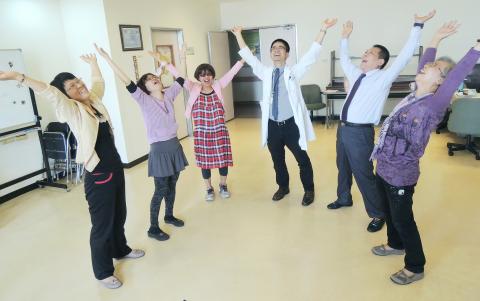More than 70 percent of the 30 cancer patients in a laughter yoga program reported sleeping better, experiencing less pain and feeling less depressed after taking some classes, Taichung Hospital said recently.
Laughter yoga teaches people to laugh hard, which increases endorphin release, helps improve their emotional well-being, enhances their immune system, and reduces inflammation and stress hormones, said Liao Chih-Ying (廖志穎), director of the hospital’s radiation oncology department.
Liao, who introduced laughter yoga from the US to the hospital in October last year, said most cancer patients experience different degrees of post-traumatic stress disorder, with about 40 percent suffering depression, anxiety, insomnia or chronic stress when they experience pain or are undergoing treatment.

Photo: Tsai Shu-yuan, Taipei Times
The increase in stress hormones, adrenaline and inflammation-
related genes also weaken their immune system, allowing cancer cells to become more aggressive and enhancing the risks of cancer metastasis, he said.
Laughter yoga leads to the release of endorphins and fake laughter can gradually become real laughter through constant practice, he said.
The endorphins can help relieve stress, improve their mood and immune system, and even prevent the recurrence and spread of cancer, he added.
The hospital invited yoga teacher Lai Ching-ju (賴晴如) to give a one-hour class to cancer patients every week, and after two months, about 70 percent of the participants reported improvements in their problems with sleeping, pain, fatigue, anxiety and depression.
A 48-year-old woman surnamed Hsieh (謝), who owns a cram school and teaches English and essay writing, said she used to work more than 10 hours a day, but was seldom sick, so she found it hard to believe after she was diagnosed with breast cancer last year.
She underwent surgery and chemotherapy, and suffered from depression and bipolar disorder, losing about 10kg in six months because of the side effects of the treatment. She often locked herself in a room crying, throwing things around, slamming her body against the wall and collected sleeping pills as she contemplated suicide.
When the hospital’s volunteers invited her to attend the laughter yoga class, she could not laugh at all at first. However, by starting first with fake laughs, playing games and practicing meditation, she was able to laugh from the heart during the second class and gradually laughed harder, regained her appetite and continues practicing at home.
She imagined her body completely recovered, read jokes on the Internet and has become truly happy, always greeting people with a smile, Hsieh said.
Laughter yoga has helped improved her relationship with her family and encouraged her to travel, Hsieh said, adding that she has learned to be grateful to the sickness that has turned her life around.
A restaurant owner surnamed Wang (王), who was diagnosed with Stage 3 gastric cancer two years ago, had to have two-thirds of his stomach removed, and went through electrotherapy and chemotherapy. Wang said he thought he was “almost about to die” because he could not eat anything.
He said he was always in low spirits, but later thought he might as well try laughter yoga as a last resort.
“I found out that I wanted to laugh as much as I could, to laugh away the cancer cells and that I would rather die laughing than crying,” Wang said.
“Now, I feel happy all the time, doing volunteer work, Chinese calligraphy, practicing taichi and living an enriched life,” he added.

Nipah virus infection is to be officially listed as a category 5 notifiable infectious disease in Taiwan in March, while clinical treatment guidelines are being formulated, the Centers for Disease Control (CDC) said yesterday. With Nipah infections being reported in other countries and considering its relatively high fatality rate, the centers on Jan. 16 announced that it would be listed as a notifiable infectious disease to bolster the nation’s systematic early warning system and increase public awareness, the CDC said. Bangladesh reported four fatal cases last year in separate districts, with three linked to raw date palm sap consumption, CDC Epidemic Intelligence

Two Taiwanese prosecutors were questioned by Chinese security personnel at their hotel during a trip to China’s Henan Province this month, the Mainland Affairs Council (MAC) said yesterday. The officers had personal information on the prosecutors, including “when they were assigned to their posts, their work locations and job titles,” MAC Deputy Minister and spokesman Liang Wen-chieh (梁文傑) said. On top of asking about their agencies and positions, the officers also questioned the prosecutors about the Cross-Strait Joint Crime-Fighting and Judicial Mutual Assistance Agreement, a pact that serves as the framework for Taiwan-China cooperation on combating crime and providing judicial assistance, Liang

The manufacture of the remaining 28 M1A2T Abrams tanks Taiwan purchased from the US has recently been completed, and they are expected to be delivered within the next one to two months, a source said yesterday. The Ministry of National Defense is arranging cargo ships to transport the tanks to Taiwan as soon as possible, said the source, who is familiar with the matter. The estimated arrival time ranges from late this month to early next month, the source said. The 28 Abrams tanks make up the third and final batch of a total of 108 tanks, valued at about NT$40.5 billion

Reports of Taiwanese going missing, being detained or interrogated, or having their personal liberties restricted in China increased about fourfold annually last year, the Mainland Affairs Council (MAC) said yesterday. Last year, 221 Taiwanese who traveled to China were reported missing, were detained and interrogated, or otherwise had their personal freedom restricted, up from 55 the previous year, the council said. Reopening group tours to China would be risky, as it would leave travelers with no way to seek help through official channels after Beijing shut down dialogue between the associations tasked with handling cross-strait tourism, the MAC said. Taipei’s Taiwan Strait Tourism